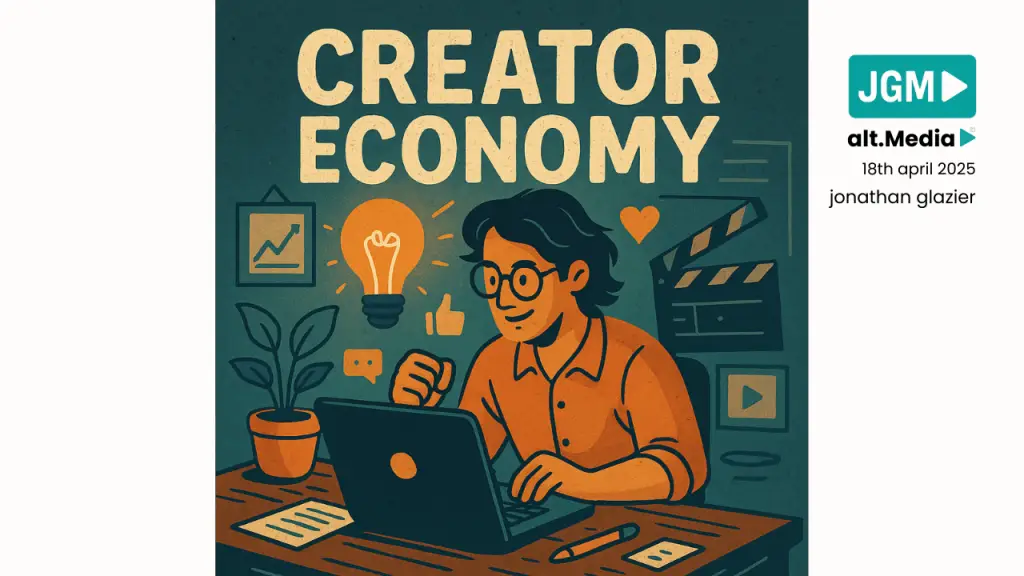I’m having a bit of a crisis. Not about who I am — that I’ve figured out over the years. But about what I am.
For most of my life, I’ve been someone who made TV. Started in sound, moved into directing, then producing. Eventually I was running departments at the BBC, then working with U.S. networks, then flying to New Zealand, then returning to a struggling independent scene in the UK. Finally, I found my niche in international production. Shows like Asia’s Got Talent, I Can See Your Voice, and Sadeem.com helped define that phase of my career.
It worked. Until it didn’t.
When the Work Disappears, the Questions Begin
It’s not that I stopped being good at what I do. I still direct, produce, troubleshoot, mentor, and deliver. But the demand for what I do has dried up. The kind of shows I’ve spent decades making are no longer being commissioned — not at the same rate, not with the same certainty.
I’m not the only one. The industry is contracting. Freelancers are struggling. Projects are on hold. Big companies are shrinking. The slowdown isn’t just local — it’s global.
So I found myself asking a question I never expected to ask again:
What am I now?
I Know Who I Am — But What Am I?
This isn’t some midlife crisis or personal reinvention story. I’ve done enough reflection for one lifetime. I know who I am.
What I don’t know is how to describe what I do now. If traditional TV is no longer the centre of my professional world, then where do I take those same skills? Who needs someone like me — someone who knows how to craft content, tell stories, manage production, solve creative problems, and train others to do the same?
The answer, I think, might be here:
The Creator Economy.
Why the Creator Economy Feels Like a New Beginning
Now, just to be clear — I’m not turning into a YouTuber. I’m not trying to sell online courses about selling online courses. That’s not the Creator Economy I’m talking about.
I’m talking about a space where real content gets made. Stuff that informs, educates, and entertains. Formats, games, documentaries, quizzes, drama, and reality shows — just done differently, watched differently, and funded differently.
The Creator Economy is becoming a full-blown industry, with roles at every level. Not just creators and influencers, but editors, producers, researchers, organisers, assistants, and creative leads. The kind of jobs that used to only exist in broadcast or film are now cropping up on digital platforms and creator-led teams.
It feels a bit like television in its early years. Unstructured, fast-moving, full of opportunity — if you know where to look.
Rebuilding, Not Reinventing
This is not a reinvention. It’s a reapplication.
I’m taking what I know and putting it to work in a new space. The Creator Economy needs people who understand audiences, story beats, emotional payoffs, visual structure, and scalable ideas. It needs people who’ve delivered real content under pressure. It needs people like us — if we’re ready to adapt.
This is the start of that shift for me. And if you’re asking similar questions, maybe it’s your start too.
What Comes Next? What is the Creator Economy?
This is the first in a new blog series where I explore how people with backgrounds in TV, film, production, and storytelling can find their place in the Creator Economy.
Next up: “What Is the Creator Economy?”
I’ll break down what it is, what it’s not, and why it might be your next move too.
Let’s Build Something New
If you’re a creative professional, director, freelancer, showrunner, or just someone who feels the ground shifting under your feet — join me. There’s no map yet. But there’s something happening. I believe the Creator Economy is the next big space for people like us to thrive — not just survive.
Let’s figure it out together.
—
Consultant, Director, Format Creator
Helping professionals turn everything into content for the creator economy
#CreatorEconomy #TVtoCreator #ContentStrategy #ProductionLife #DigitalContent #MediaCareers #CreativeIndustry #StorytellingMatters #BroadcastToDigital #ContentConsultant
The Plan an audit you can do as well
1. Positioning Statement (Who You Are Now)
Old world:
Executive Producer | Director | Format Creator in broadcast TV
New world:
Creative Consultant + Content Strategist for the Creator Economy
Helping individuals and companies turn ideas into engaging content across platforms.
2. Your New Core Message
“I help creators, founders, and media professionals turn everything into content—by applying TV-level storytelling, structure, and strategy to the creator economy.”
That becomes the tagline across your profiles, lead magnets, and intro content.
3. Your Creator-Economy Pillars
Your content, products, and services sit on three value pillars:
- Smarter Storytelling
- Teach creators and businesses how to structure content with hooks, narrative, emotional payoffs—like TV pros do.
- Think: short Reels, course modules, PDFs, mini-consults.
- Better Workflow
- Tools, Notion templates, systems, and SOPs you’ve built—now adapted for solo creators, podcasters, YouTubers, etc.
- Format Thinking
- Help creators “package” their content ideas like shows: what’s the repeatable structure? What’s the hook? What’s the value promise?
4. Where You Show Up (Platform Focus)
- LinkedIn – your personal brand HQ
- Instagram Reels – short, engaging insights (TV for creators)
- YouTube Shorts (then longform) – educational + review + behind the scenes
- Email Newsletter – weekly drops with insights, tools, and mini case studies
5. How You’re Different
Unlike many creator economy experts, you:
- Come from the top tier of professional storytelling
- Know how to balance audience engagement + structure
- Understand production value without wasting time on perfection
- Have mentored creators and talent already—now you’re just doing it more publicly



